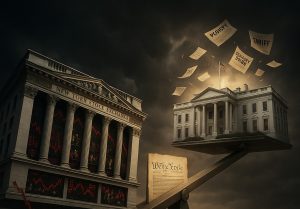
Monday’s trading session highlighted how government decisions increasingly shape capital flows. The day brought three distinct market moves, each triggered by policy announcements from Washington.
Solar stocks fell sharply after the administration said it would end clean energy tax credits within 45 days. Enphase dropped 3.4%, while SolarEdge and Sunrun declined 6.5% and 5.9% respectively. The speed of these declines shows how dependent this sector has become on federal support.
The solar industry’s immediate response reveals the extent of its reliance on government subsidies. These companies built business models around federal incentives that could disappear with policy changes. When subsidies end, investors must evaluate whether these businesses can compete on pure economics.
Some solar companies may adapt and thrive. Others will struggle to maintain margins without tax credit support. The market is sorting through which companies have genuine competitive advantages and which were dependent on policy scaffolding.
Treasury yields climbed following two announcements: new tariffs on imports from Japan, South Korea, and several other countries, plus the Treasury Department’s plan to issue $119 billion in additional debt. The 10-year yield rose to 4.42%, with the 30-year approaching 5%. Bond investors are pricing in both higher inflation from tariffs and increased supply from new debt issuance.
Higher tariffs increase costs throughout supply chains. Companies facing elevated input prices typically pass costs to consumers, contributing to inflation. Additional government debt issuance means more Treasury securities competing for investor capital.
Bond yields reflect these realities. When government spending increases while trade costs rise, investors demand higher returns to compensate for inflation risk and increased debt supply. This affects borrowing costs across the economy, from corporate financing to consumer credit.
Small-cap stocks declined, with the Russell 2000 falling 1.6% and underperforming large-cap indices. This appears to reflect investor concerns about how smaller companies will handle rising interest rates and increased input costs from tariff policies. The decline shows that policy uncertainty hits smaller firms particularly hard.
The Russell 2000’s underperformance reflects the vulnerability of smaller companies to policy changes. As bond yields signal changing economic conditions, portfolio managers may be avoiding companies with less financial flexibility. Money appears to be moving toward larger companies better positioned to handle rising costs and interest rates.
Small companies typically face greater pressure from rising interest rates and increased input costs. Their decline confirms concerns about how policy uncertainty affects businesses with limited resources and financing options.
Each of Monday’s market moves stems from government decisions made with limited market consultation. Solar subsidies ended abruptly. Tariff announcements came via social media posts. Debt issuance plans emerged from Treasury guidance.
Markets function best with predictable policy frameworks. When rules change quickly, capital becomes reactive instead of strategic. This creates volatility that can persist until investors gain clarity about the direction and consistency of government economic policy.
Free enterprise depends on government restraint. Markets allocate capital most effectively when political interference remains minimal and predictable. The current environment challenges this principle.
Solar companies should compete on innovation and cost efficiency, not tax advantages. Trade policy should serve long-term strategic interests, not short-term political goals. Fiscal policy should maintain sustainable debt levels while supporting genuine economic growth.
Monday’s market movements show what happens when policy drives investment decisions. The administration faces a choice: establish coherent long-term frameworks that allow markets to operate efficiently, or continue making tactical moves that force constant market adjustments.
The question facing investors and policymakers is whether this approach will build lasting economic strength or create new distortions that markets will eventually need to correct.
Sandra McCall is a contributor to Wealth Creation Inveseting, where she delivers sharp, unapologetic commentary on economic freedom, market accountability, and leadership performance. Her work challenges centralized overreach and defends the foundational principles of free enterprise with clarity, consequence, and unwavering commitment to constitutional governance.
